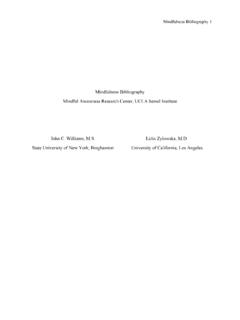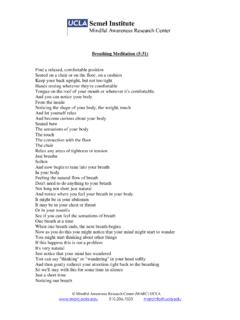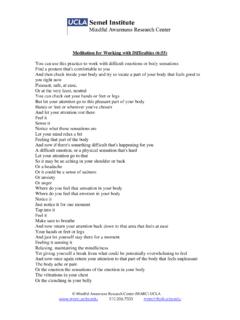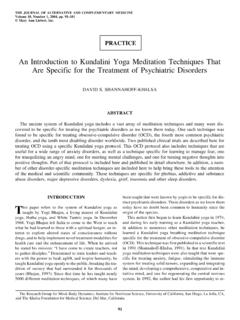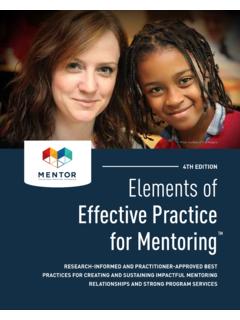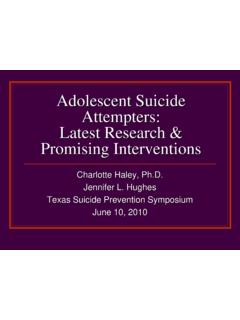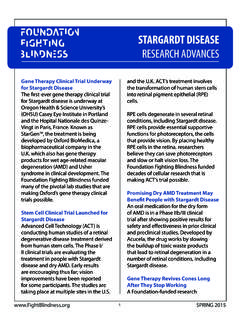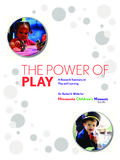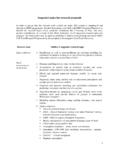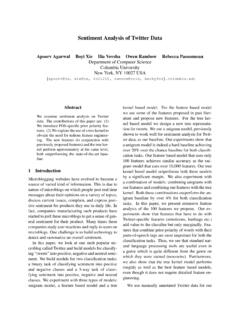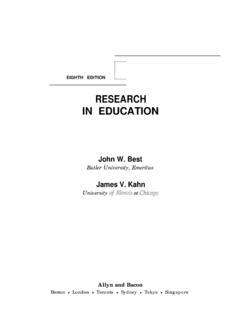Transcription of MARC mindfulness research summary
1 Brief summary of mindfulness research Greg Flaxman and Lisa Flook, Researchers interest in mindfulness practice has steadily increased as studies continue to reveal its beneficial effects. Current research looks at how the brain responds to mindfulness practice, how relationships benefit, and how physical and mental health improves, as well as other topics. The following presents a sample of the results from investigations seeking to uncover more of what mindfulness can offer to enhance human well-being. Brain & Immune System A burgeoning field of study has grown out of interest for the effects of mindfulness practice on the brain. Current literature points towards the potential for mindfulness to affect the structure and neural patterns present in the brain.
2 Scientists have seen these results last not only during mindfulness practice, but also during the daily life of practitioners. The results of one study published in NeuroReport in 2005 show thicker cortical regions related to attention and sensory processing in long-term meditation practitioners compared to non-meditators. These findings also suggest that meditation practice may offset cortical thinning brought on by aging1. A recent study outlines the difference in neural functions related to emotion in expert meditators and novice meditators. Individuals performed compassion meditations, while researchers measured how the regions in the brain responsible for emotion regulation reacted to varying stimuli.
3 The more advanced meditators showed more activation in those areas of the brain that detect emotional cues, demonstrating a heightened empathic awareness2. However, not all studies involve expert meditators. A 2003 study focused on how an 8-week training course would affect the brains and immune systems of individuals. This investigation provided some evidence of increased activation in a region of the brain correlated with positive affect, as well as evidence that the immune system would react more robustly in antibody production after meditation training3. Another recent study showed better stress regulation, as measured by a faster decrease in levels of the stress hormone cortisol following a stressful laboratory task, among Chinese undergraduates after 5 days of meditation training at 20 minutes a day.
4 These students also reported less anxiety, depression, and anger compared to a group of students that received relaxation training4. Relationships mindfulness training may affect an individual s ability to harbor successful social relationships as well. A University of North Carolina at Chapel Hill study demonstrated a correlation between mindfulness practice in couples and an enhanced relationship. The couples reported improved closeness, acceptance of one another, autonomy, and general relationship satisfaction5. A 2007 study replicated this finding, also demonstrating a correlation between mindfulness and quality of communication between romantic partners6. Loving-kindness meditation, which can involve positive imagery or wishes directed toward others or self, can affect how one relates to others.
5 A recent study examined how individuals reacted to viewing photographs of strangers after loving-kindness meditation. The meditation significantly affected the positive values they attributed to those strangers, demonstrating a relationship between loving-kindness meditation and social connectedness7. mindfulness practice can benefit familial relationships. Parents of children with developmental disabilities described increased satisfaction with their parenting, more social interactions with their children, and less parenting stress as a result of mindfulness training8. In another study carried out by the same researchers regarding parents of children with autism, the same results of increased satisfaction in their parenting skills and relationship applied9.
6 In both studies, the children of these parents benefited from the mindful parenting practice, showing decreases in aggressive and non-compliant behavior. In addition, a mindfulness intervention for adolescents with externalizing disorders that involved their parents in the treatment showed improvement in the happiness of the children, as well as the parents perception of their child s self-control10. Clinical A popular form of mindfulness intervention, devised by Jon Kabat-Zinn, is mindfulness -Based Stress Reduction (MBSR). This intervention originally came about to help those with chronic pain issues or stress-related disorders. Typically in MBSR programs, individuals go through an 8-10 week session in which they practice for at least 45 minutes a day.
7 Numerous therapies incorporating mindfulness have sprouted in recent years. mindfulness -based cognitive therapy, similar to MBSR, teaches individuals to recognize their thoughts and feelings with a nonjudgmental attitude. When researchers studied its effectiveness in preventing a relapse of depression for those in remittance from a depressive episode, 37% of those that went through an 8-week MBCT program experienced a relapse compared to 66% of those not in the program11. Helping professionals can use mindfulness to improve their abilitiy to empathize with those they serve as well. A study of an 8-week MBSR course for nurses showed that their mindfulness practice facilitated empathic attitudes, as well as decreased their tendency to take on others negative emotions12.
8 A previous study of health-care professionals going through the 8-week MBSR program presented results of increased self-compassion and reduced stress in those individuals13. Such self-care may trickle down to improve upon the quality of the relationship between those professionals and their clients. While the majority of mindfulness studies have focused on adults, some pertain to the practice of mindfulness in children and adolescents. A series of studies have documented its use as an intervention for youth with psychological disturbances. In one 6-week study with anxious children, teachers reported an improvement in academic functioning and decrease in symptoms of anxiety in the children14. Another utilized mindfulness -based cognitive therapy with the result of significantly reducing observable internalizing and externalizing symptoms.
9 Over 80% of children and parents involved in this study thought that schools should teach mindfulness15. A mindfulness intervention for several adolescents with conduct disorder resulted in a significant decrease in aggressive behavior. They reported benefits from mindfully returning their attention to the soles of their feet during distressing situations16. In a recent study for adolescents with ADHD, mindfulness training significantly reduced symptoms associated with their disorder17. Education There is increasing interest in the utility of mindfulness practices in educational settings. A study of 1st-3rd grade children that involved a 12-week program of breath awareness and yoga (delivered once per week every other week) showed improvements in children s attention and social skills as well as decreased test anxiety in children who went through the training as compared to controls18.
10 Another program that combined elements of MBSR and tai chi for a small group of middle school students in a 5-week program found that students reported an increased sense of calm, connection to nature, and improved sleep after going through the training19. Two pilot studies conducted through UCLA s Mindful Awareness research Center indicate improvements in self-regulatory abilities among preschool and elementary school students who participated in an 8-week mindful awareness practices training program (developed and taught by InnerKids in two 30-minute sessions per week). Specifically, children who were initially less well-regulated showed the strongest improvements subsequent to training, as compared to children in the control group who did not receive the training20 21.
